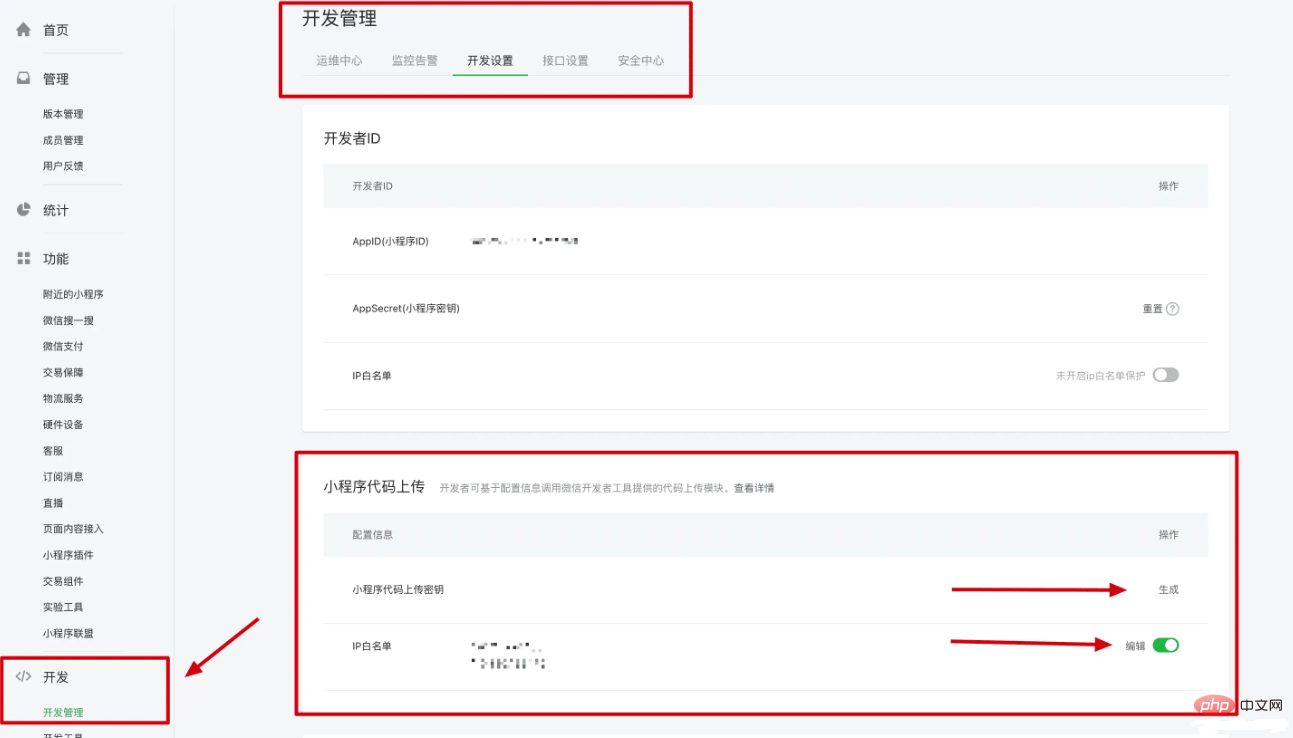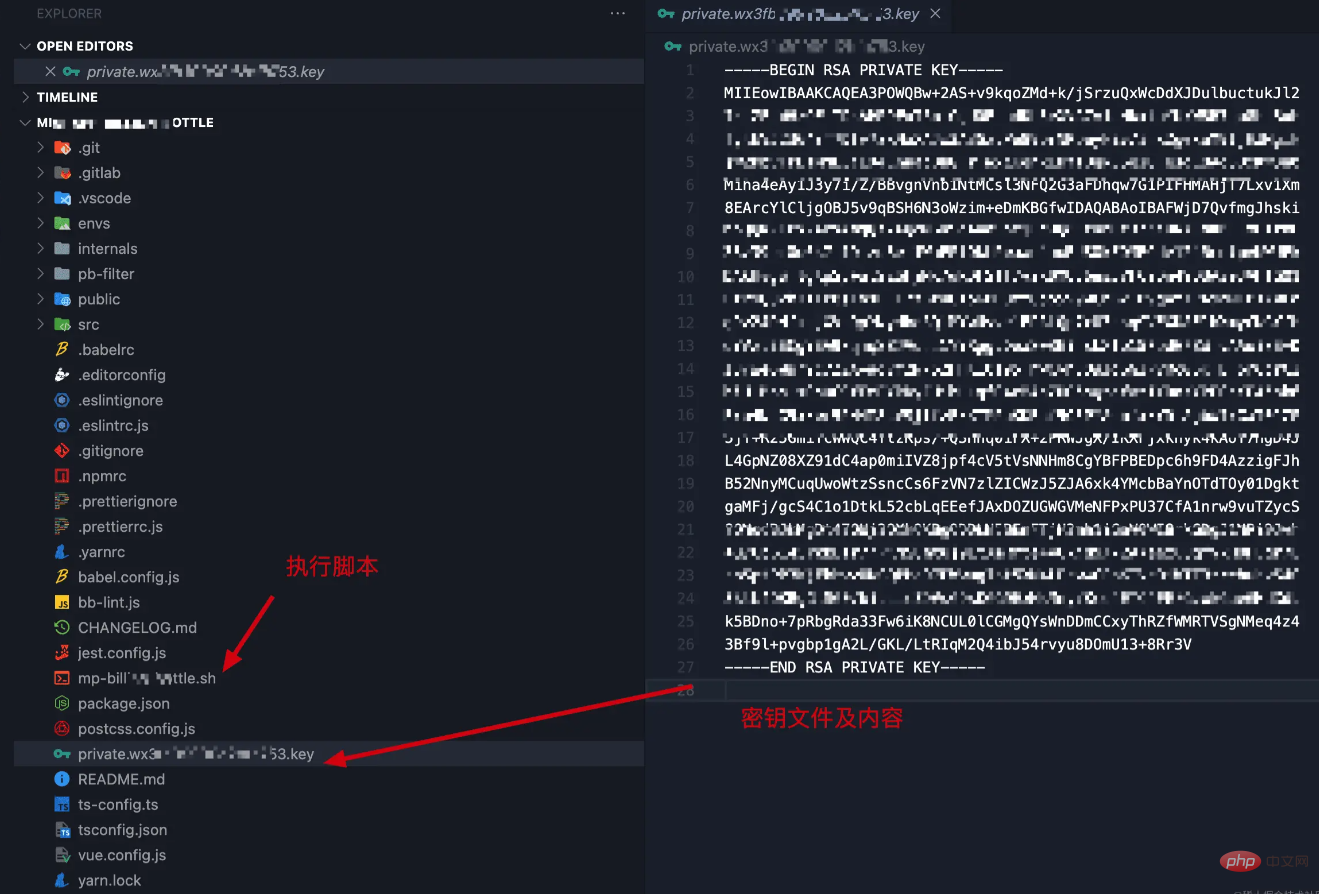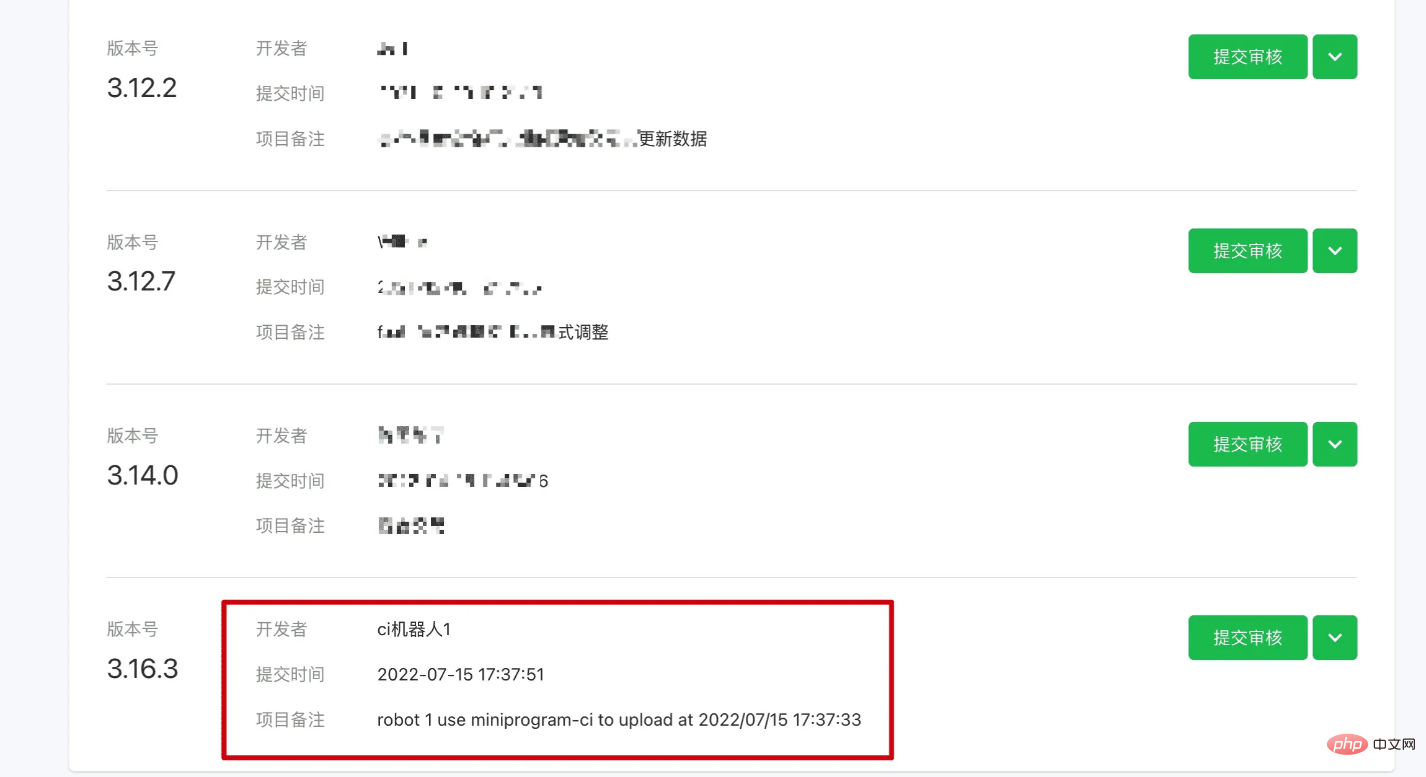WeChat Mini Program Automated Deployment
This article brings you relevant content about WeChat Mini Programs, which mainly introduces issues related to the automated deployment of WeChat Mini Programs. The daily development process of WeChat Mini Programs is relatively cumbersome. The automated deployment process can shorten this process. Let’s take a look at it. I hope it will be helpful to everyone.

[Related learning recommendations: 小program learning tutorial]
Let’s first sort out the daily process of developing WeChat applet: After the code is developed, we must first submit it to the code repository, then use WeChat developer tools to run the code, then upload the code to the WeChat mini program backend through the developer tools, and finally submit it for review in the backend.
It is not difficult to see that the process is still relatively cumbersome. The automated deployment process can help us reduce this process and free up the hands of code farmers. Let’s look down on how to achieve this.
miniprogram-ci
The automated deployment process of WeChat mini programs must rely on miniprogram-ci, this plug-in.
miniprogram-ci is a compilation module for mini program/mini game project codes extracted from WeChat developer tools.
Developers can use miniprogram-ci independently to upload, preview and other operations of the mini program code without opening the mini program developer tools.
Because the execution of the script depends on this plug-in, we can install this plug-in on the server where the script is to be executed, or in a local project.
npm install miniprogram-ci --save
WeChat public platform configuration
Log in to the public platform, open development-development management-development settings, find the mini program code upload configuration item, generate the mini program code upload key, and add ip white The list and key files can be stored on the server where the script is to be executed, or in the project, as long as the script can access them.

Key file
The specific contents of the key file generated by WeChat public platform are as follows:

Script
Write the execution script of xxx.sh and name it as you like.
set -e
while read -r line
do
if [[ $line =~ "version" ]]
then
declare a=${line##*:}
declare b=${a#*\"}
declare version=${b%\"*}
break
fi
done < package.json
echo $version
yarn
echo "开始编译..."
start1=$(date +%s)
yarn build:mp-weixin
end1=$(date +%s)
take1=$(( end1 - start1 ))
echo "Compile Success:${take1}s"
echo "微信小程序上传..."
start2=$(date +%s)
# upload
miniprogram-ci \
upload \
--pp ./dist/build/mp-weixin \
--pkp ./private.wx3fxxxxxxxx3.key \
--appid wx3fxxxxxxxx3 \
--uv $version \
--threads 1 \
-r 1 \
--enable-es6 true \
--enable-es7 true \
--enable-autoprefixwxss true \
--enable-minify true \
end2=$(date +%s)
take2=$(( end2 - start2 ))
echo "Upload Success: ${take2}s"
take3=$(( end2 - start1 ))
echo "Total Time: ${take3}s"Explanation of specific script modules
set -e
Indicates that if the return code of all subsequent bash commands is not 0, the script will exit immediately, and subsequent scripts will not have a chance to execute. In human terms, if an error is reported during the execution of the script, it will immediately exit and stop execution.
while read -r line
do
if [[ $line =~ "version" ]]
then
declare a=${line##*:}
declare b=${a#*\"}
declare version=${b%\"*}
break
fi
done < package.json
echo $versionThe above script reads the contents of the package.json file line by line, finds the version field, and obtains its corresponding value to define a $version variable. To put it bluntly, it is to get the version number of the project, because it will be used below.
yarn
echo "开始编译..."
start1=$(date +%s)
yarn build:mp-weixin
end1=$(date +%s)
take1=$(( end1 - start1 ))
echo "Compile Success:${take1}s"
echo "微信小程序上传..."
start2=$(date +%s)Seeing yarn, everyone should know that this script is to install project dependencies, and package and compile small program projects. Start1, end1, and take1 are for recording time and can be ignored.
# upload miniprogram-ci \ upload \ --pp ./dist/build/mp-weixin \ --pkp ./private.wx3fxxxxxxxx3.key \ --appid wx3fxxxxxxxx3 \ --uv $version \ --threads 1 \ -r 1 \ --enable-es6 true \ --enable-es7 true \ --enable-autoprefixwxss true \ --enable-minify true \
The above script is the core.
It is not difficult to see from the script that we upload the code through miniprogram-ci.
Specific parameter meaning:
--pp: Compiled and packaged product file path
--pkp: WeChat public platform The path of the private key file produced
--appid: the appid of the mini program
--uv: the version number of the project
--threads: Number of open threads
-r: Robot number (this parameter does not matter)
At this point, the entire script is basically completed.
Automated deployment implementation
Main three core parts:
Upload script
miniprogram-ci Plug-in
Key file
There are many ways to implement automated deployment, and this article mainly explains two.
The first way (recommended)
jenkins gitlab webhook
Place the script and key file directly in the project In the root directory, Jenkins installs webhook related plug-ins, and gitlab configures webhook, so that changes in the master branch code can trigger webhook, which in turn triggers jenkins execution. Don't forget to install the miniprogram-ci plug-in globally on the jenkins server.
In this way, we have achieved that when the business requirements are developed and the code is merged into the master branch, the webhook is automatically triggered, which in turn triggers Jenkins to execute the upload script.
All our developers need to do is merge the code into the master branch, and then go to the mini program background to select the uploaded version and submit it for review.
nice~
The second method
is based on local terminal execution and puts the script and key file directly in In the project root directory, install the miniprogram-ci plug-in locally and execute the script directly in the terminal.
./ci-xxx.sh
The picture below is the version uploaded by automated deployment:

[Related learning recommendations: 小program learning tutorial]
The above is the detailed content of WeChat Mini Program Automated Deployment. For more information, please follow other related articles on the PHP Chinese website!

Hot AI Tools

Undress AI Tool
Undress images for free

Undresser.AI Undress
AI-powered app for creating realistic nude photos

AI Clothes Remover
Online AI tool for removing clothes from photos.

Clothoff.io
AI clothes remover

Video Face Swap
Swap faces in any video effortlessly with our completely free AI face swap tool!

Hot Article

Hot Tools

Notepad++7.3.1
Easy-to-use and free code editor

SublimeText3 Chinese version
Chinese version, very easy to use

Zend Studio 13.0.1
Powerful PHP integrated development environment

Dreamweaver CS6
Visual web development tools

SublimeText3 Mac version
God-level code editing software (SublimeText3)
 Xianyu WeChat mini program officially launched
Feb 10, 2024 pm 10:39 PM
Xianyu WeChat mini program officially launched
Feb 10, 2024 pm 10:39 PM
Xianyu's official WeChat mini program has quietly been launched. In the mini program, you can post private messages to communicate with buyers/sellers, view personal information and orders, search for items, etc. If you are curious about what the Xianyu WeChat mini program is called, take a look now. What is the name of the Xianyu WeChat applet? Answer: Xianyu, idle transactions, second-hand sales, valuations and recycling. 1. In the mini program, you can post idle messages, communicate with buyers/sellers via private messages, view personal information and orders, search for specified items, etc.; 2. On the mini program page, there are homepage, nearby, post idle, messages, and mine. 5 functions; 3. If you want to use it, you must activate WeChat payment before you can purchase it;
 Implement image filter effects in WeChat mini programs
Nov 21, 2023 pm 06:22 PM
Implement image filter effects in WeChat mini programs
Nov 21, 2023 pm 06:22 PM
Implementing picture filter effects in WeChat mini programs With the popularity of social media applications, people are increasingly fond of applying filter effects to photos to enhance the artistic effect and attractiveness of the photos. Picture filter effects can also be implemented in WeChat mini programs, providing users with more interesting and creative photo editing functions. This article will introduce how to implement image filter effects in WeChat mini programs and provide specific code examples. First, we need to use the canvas component in the WeChat applet to load and edit images. The canvas component can be used on the page
 Implement the drop-down menu effect in WeChat applet
Nov 21, 2023 pm 03:03 PM
Implement the drop-down menu effect in WeChat applet
Nov 21, 2023 pm 03:03 PM
To implement the drop-down menu effect in WeChat Mini Programs, specific code examples are required. With the popularity of mobile Internet, WeChat Mini Programs have become an important part of Internet development, and more and more people have begun to pay attention to and use WeChat Mini Programs. The development of WeChat mini programs is simpler and faster than traditional APP development, but it also requires mastering certain development skills. In the development of WeChat mini programs, drop-down menus are a common UI component, achieving a better user experience. This article will introduce in detail how to implement the drop-down menu effect in the WeChat applet and provide practical
 WeChat applet implements image upload function
Nov 21, 2023 am 09:08 AM
WeChat applet implements image upload function
Nov 21, 2023 am 09:08 AM
WeChat applet implements picture upload function With the development of mobile Internet, WeChat applet has become an indispensable part of people's lives. WeChat mini programs not only provide a wealth of application scenarios, but also support developer-defined functions, including image upload functions. This article will introduce how to implement the image upload function in the WeChat applet and provide specific code examples. 1. Preparatory work Before starting to write code, we need to download and install the WeChat developer tools and register as a WeChat developer. At the same time, you also need to understand WeChat
 What is the name of Xianyu WeChat applet?
Feb 27, 2024 pm 01:11 PM
What is the name of Xianyu WeChat applet?
Feb 27, 2024 pm 01:11 PM
The official WeChat mini program of Xianyu has been quietly launched. It provides users with a convenient platform that allows you to easily publish and trade idle items. In the mini program, you can communicate with buyers or sellers via private messages, view personal information and orders, and search for the items you want. So what exactly is Xianyu called in the WeChat mini program? This tutorial guide will introduce it to you in detail. Users who want to know, please follow this article and continue reading! What is the name of the Xianyu WeChat applet? Answer: Xianyu, idle transactions, second-hand sales, valuations and recycling. 1. In the mini program, you can post idle messages, communicate with buyers/sellers via private messages, view personal information and orders, search for specified items, etc.; 2. On the mini program page, there are homepage, nearby, post idle, messages, and mine. 5 functions; 3.
 Implement image rotation effect in WeChat applet
Nov 21, 2023 am 08:26 AM
Implement image rotation effect in WeChat applet
Nov 21, 2023 am 08:26 AM
To implement the picture rotation effect in WeChat Mini Program, specific code examples are required. WeChat Mini Program is a lightweight application that provides users with rich functions and a good user experience. In mini programs, developers can use various components and APIs to achieve various effects. Among them, the picture rotation effect is a common animation effect that can add interest and visual effects to the mini program. To achieve image rotation effects in WeChat mini programs, you need to use the animation API provided by the mini program. The following is a specific code example that shows how to
 Use WeChat applet to achieve carousel switching effect
Nov 21, 2023 pm 05:59 PM
Use WeChat applet to achieve carousel switching effect
Nov 21, 2023 pm 05:59 PM
Use the WeChat applet to achieve the carousel switching effect. The WeChat applet is a lightweight application that is simple and efficient to develop and use. In WeChat mini programs, it is a common requirement to achieve carousel switching effects. This article will introduce how to use the WeChat applet to achieve the carousel switching effect, and give specific code examples. First, add a carousel component to the page file of the WeChat applet. For example, you can use the <swiper> tag to achieve the switching effect of the carousel. In this component, you can pass b
 Implement the sliding delete function in WeChat mini program
Nov 21, 2023 pm 06:22 PM
Implement the sliding delete function in WeChat mini program
Nov 21, 2023 pm 06:22 PM
Implementing the sliding delete function in WeChat mini programs requires specific code examples. With the popularity of WeChat mini programs, developers often encounter problems in implementing some common functions during the development process. Among them, the sliding delete function is a common and commonly used functional requirement. This article will introduce in detail how to implement the sliding delete function in the WeChat applet and give specific code examples. 1. Requirements analysis In the WeChat mini program, the implementation of the sliding deletion function involves the following points: List display: To display a list that can be slid and deleted, each list item needs to include







